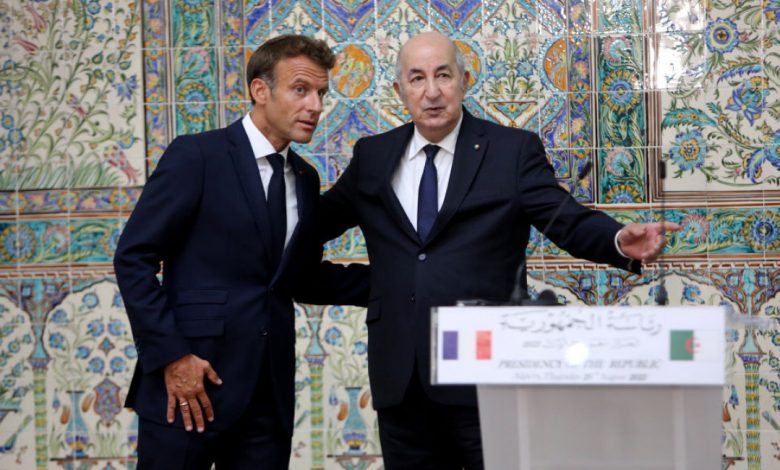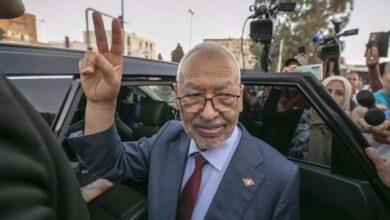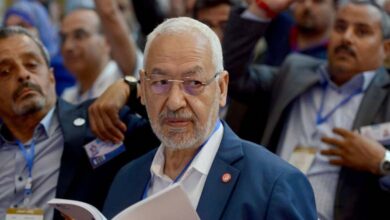Macron will definitely not apologize to Algeria for years of colonialism

French President Emmanuel Macron has put an end to the speculation that marred the rapprochement between France and Algeria on the subject of memory, and the possibility that he might personally apologize for the years of colonialism and the crimes committed against the Algerians during it. Meanwhile, the colonial past is at the heart of the tensions between the two countries and looms over a troubled relationship for the most part, although there are signs in the past months indicating the beginning of a new and more solid phase after an earlier crisis.
In a lengthy interview with Algerian writer Kamel Daoud published by the French weekly Le Point on Wednesday evening, Macron said he would not ask Algerians to “forgive” France for colonizing their country, but that he hoped to receive his Algerian counterpart Abdelmadjid Tebboune in Paris this year to continue working together on the memory and reconciliation issue between the two countries.
The question of France’s apology for its colonial past in Algeria (1830-1962) is at the heart of bilateral relations and the frequent fluctuations between the two countries.
“You don’t have to ask for forgiveness, that’s not the point. “The worst thing that could happen is to say ‘we apologize’ and ‘we are on our way’,” he said, stressing that “the work of memory and history is not a mere calculation, it is the exact opposite.”
Memory and history “mean recognizing that in the process of doing so there are indescribable, unfathomable, unproven, perhaps unforgivable things,” he said.
The invocation of French colonialism (1830-1962) and the bloody War of Liberation provoked sharp rivalry between the two countries in the fall of 2021, following Macron’s subsequent remark. “France must free itself from the colonialist complex and Algeria from the colonialist complex,” the Algerian president said.
“In 2020, Algeria was aptly presented with a report by French historian Benjamin Stora, commissioned by Macron, calling for a series of initiatives for reconciliation between the two countries.” The report lacked any recommendation for an apology or remorse, which Algeria consistently demands.
“I hope that President Tebboune will be able to come to France in 2023 to continue an unprecedented act of friendship” after Macron’s own visit to Algeria in August 2022, the French president said.
Asked whether Tebboune’s upcoming visit to France could include the guest president’s participation in a ceremony in front of the Algerian monument of Prince Abdelkader at the Cemetery for the Heroes of the Resistance to Colonialism in the town of Ambouaz (southwest of Paris), Macron said that such a matter would be “a very beautiful and very strong moment,” adding that “I hope this happens.”
Macron said such a ceremony “will have meaning in the history of the Algerian people. For the French people, it will be an opportunity to understand often hidden realities.”
Prince Abdelkader (1808-1883) was arrested in Ambuaz with several members of his family from 1848 to 1852.
Macron has stepped up his memory profile, acknowledging the French military’s responsibility in the killing of mathematician Maurice Audin and national lawyer Ali Boumendjel during the “Battle of Algiers” in 1957, and decrying “unjustified crimes” committed by the French army during the massacre of Algerian protesters in Paris on October 17, 1961.
But the apologies for Algeria’s colonization have never come, frustrating Macron’s initiatives and increasing misunderstandings between the two sides.
The French president’s trip to Algeria last August helped put bilateral relations back on track after a crisis sparked by remarks he made in October 2021 accusing Algeria’s “military-political regime” of creating “memory rents” and questioning the existence of a pre-colonial Algerian nation.
In his interview with Le Point, Macron admitted that his remarks were wrong. “It may be a clumsy phrase and it may have hurt the feelings” of the Algerians, he said. You have to know how to reach out again.”
In December 2022, the Algerian president gave a clear signal of a thaw in relations with France after long months of tension, but the price of appeasement remains unclear as many of the contentious issues between the two countries remain unresolved.
Tebboune welcomed at the time what he described as France’s new “relations of trust” with Algeria and his personal “mutual friendship” with President Emmanuel Macron, in a new sign of the warmth returning to the often-troubled bilateral relationship.
In an interview with Le Figaro, he wished for a “new era” with France six months after his French counterpart visited Algiers. He also announced that he would make a state visit to France in 2023.
“We have a certain understanding” with the French head of state, he said. “I see him as the embodiment of a new generation that can salvage relations between our two countries. Of course he and I had unfortunate formulas, but this is the first time that it seems to me that there is such a relationship of trust between our two countries.”
The two heads of state resumed their cooperation in a joint declaration signed amid great fanfare, which paved the way in particular for the relaxation of Algeria’s visa regime in exchange for increased Algerian cooperation in the fight against illegal migration.
Macron, who is preparing to visit Rabat, called for a “de-escalation” of tensions between Algeria and Morocco, ruling out war between the two neighbors.
Algeria severed diplomatic relations with Morocco in August 2021, accusing Rabat of “hostile acts” in a decision that Rabat said was “totally unjustified.”
Macron’s upcoming visit to Morocco, scheduled for the first months of this year by French President Emmanuel Macron, is likely to draw a sort of roadmap for strengthening Moroccan-French relations.
The Moroccan diplomacy is moving on more than one track so that relations can be rectified on a solid basis, which includes a number of urgent demands, including a clear French position on the conflict in the Moroccan Sahara and the restoration of the colonial archive demanded by Rabat as part of an important stage in the history of the Kingdom. The economic and security partnership issues will also be part of a discussion that will open up to the steps of reconciliation that are being arranged at this time.












